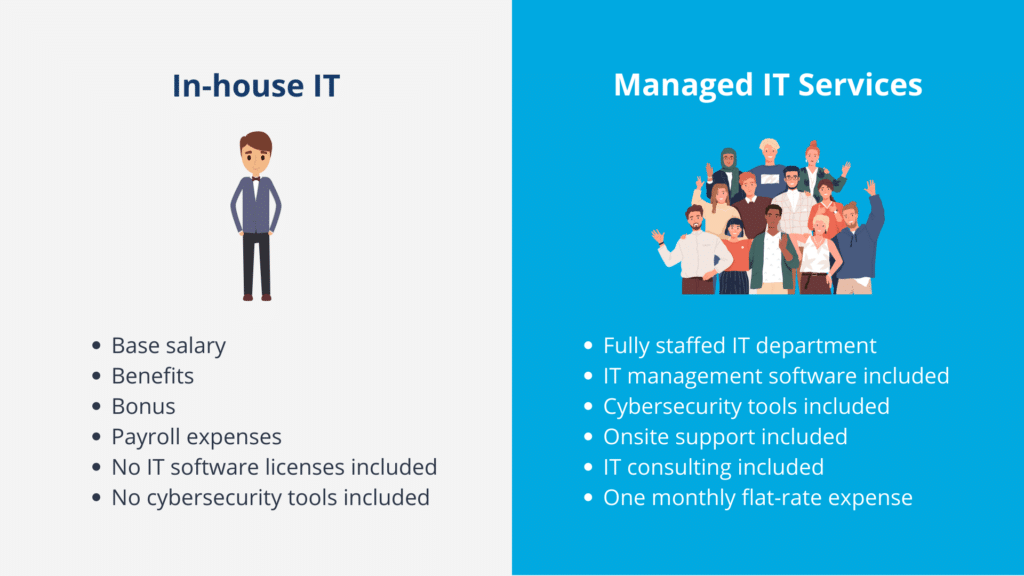The Benefits of Managed IT Services
Cost-effectiveness
One of the main benefits of managed IT services is their cost-effectiveness. Hiring and training in-house IT staff can be expensive, especially for small and medium-sized businesses. By outsourcing your IT needs to an MSP, you can significantly reduce labor costs and focus your resources on other aspects of your business.
Moreover, pricing often operates on a subscription-based model, providing predictable monthly or yearly costs, allowing businesses to budget for capital expenditures more effectively and avoid unexpected expenses.
Access to Specialized Expertise
Outsourcing your IT department gives your business access to a team of staff with diverse skill sets and expertise in various technologies. This ensures that your business has the resources and knowledge to meet its unique IT requirements. MSPs are constantly staying updated on the latest technology trends and best practices, which means your business can leverage the most innovative solutions and stay competitive in an ever-changing digital landscape.
With an IT provider, your business can take advantage of the latest tools, applications, and infrastructure without the need for significant upfront investments.
Enhanced Cybersecurity
In an age where cyber threats are becoming increasingly sophisticated, ensuring your IT infrastructure is secure is of paramount importance. Having access to a modern cybersecurity stack is one of the most powerful benefits of managed services. This proactive approach ensures that vulnerabilities are identified and addressed before they can cause significant damage.
Additionally, MSPs conduct regular security assessments to identify and rectify any weaknesses in your IT infrastructure, keeping your client data and systems safe from cyberattacks. In the event of a security breach or other IT disaster, MSPs have the resources and expertise to quickly respond, minimizing network downtime, and ensuring business continuity.
Compliance and Risk Management
Organizations in various industries face a range of data security regulations and requirements that must be met to ensure compliance. MSPs can help businesses understand and meet these requirements, ensuring that their IT systems adhere to industry standards and best practices.
MSPs can also provide ongoing monitoring and management to maintain compliance over time, helping businesses avoid potential fines, penalties, or reputational damage.
Improved Operational Efficiency
Outsourcing your IT needs to a managed service provider can lead to improved operational efficiency within your organization. MSPs help businesses optimize their business processes, resulting in improved productivity and efficiency.
With dedicated support from an MSP, issues can be resolved more quickly, minimizing disruptions to your day to day tasks. Furthermore, this allows businesses to allocate their resources more effectively, focusing on core business activities while leaving IT management and support to the experts.
Scalability and Flexibility
Businesses can scale their IT infrastructure as they grow, without the need for significant upfront investments. MSPs can quickly adapt to your changing needs, providing additional resources or scaling back services as required. This flexibility allows your business to remain agile and respond to market demands more effectively.
24/7 Proactive Monitoring and Support Services
MSPs offer around-the-clock monitoring and support services for any technical difficulties, ensuring that your IT systems are functioning optimally at all times. This constant vigilance helps identify and resolve potential issues before they escalate into major problems, preventing costly downtime and data loss.

Why Managed Services?
In today’s business landscape, information technology (IT) plays a vital role in the daily operations of companies across all industries. As technology continues to evolve, organizations face numerous challenges in managing and maintaining their IT infrastructure.
IT is at the center of all departments of a business, including finance, HR, marketing, sales, service, and management. Having a dedicated team of IT professionals behind you ensures that when your business grows, your technology can keep up.

Understanding Managed IT Services
Definition and Overview
Managed IT services refer to the outsourcing of IT management and support to a third-party provider. These providers, known as Managed Service Providers (MSPs), are responsible for monitoring, maintaining, and improving your IT infrastructure, allowing your business to focus on its core competencies.
The Different Types of Managed IT
MSPs offer a wide range of services that cater to businesses of all sizes and industries. Some of the most common services include network management, remote monitoring, software solutions, cybersecurity, cloud computing, data backup and disaster recovery, and help desk support.
Managed IT vs. Traditional IT Support
Traditional IT support involves hiring an in-house team to manage your IT infrastructure. On the other hand, managed IT services allow you to outsource these responsibilities to a team of experts. This not only reduces the burden on your internal team but also provides access to a broader range of specialized knowledge and resources.

Selecting the Right Managed Services Provider
Key Considerations When Choosing a Provider
When selecting a managed services provider, it is important to consider several factors to ensure you find the best fit for your business. These factors include the provider’s experience in your industry, their reputation, the range of services they offer, and their ability to customize solutions based on your specific needs.
Evaluating Their Expertise and Reputation
Before settling on a managed IT services provider, it is essential to assess their expertise and reputation in the field. Look for a provider with a proven track record of delivering successful IT solutions to businesses similar to yours. Check online reviews, testimonials, and case studies to gauge their level of expertise and the quality of their services.
Assessing the Contract Terms and Service Level Agreements
Carefully review the contract terms and service level agreements (SLAs) offered by the managed IT services provider. SLAs outline the provider’s commitment to maintaining specific performance standards, such as response times, uptime, and data recovery. Ensure that the SLAs meet your business’s requirements and that the provider can be held accountable for any lapses in service.
Analyzing Cost vs. Value
While cost is an important factor when choosing a managed IT services provider, it should not be the only consideration. Analyze the value that the provider brings to your business, including their expertise, range of services, and the potential for long-term cost savings. Remember that the cheapest option may not always be the best choice, especially if it compromises the quality of service.

Implementing A Managed Services Model
Transitioning from In-house IT Support
Making the transition from in-house IT staff to a managed service provider can be a significant change for a business. To ensure a smooth transition, it is essential to work closely with your managed service provider to develop a detailed plan. This plan should outline the steps involved in the transition process, including the transfer of responsibilities, the training of employees, and the decommissioning of any obsolete systems or processes.
By working together with your MSP, you can minimize disruptions to your operations and ensure a seamless transition to managed services.
Integrating Managed Services with Existing Systems
Integrating managed services with your existing systems is a critical aspect of implementation. Your service provider should work with you to assess your current IT infrastructure, identify any potential compatibility issues, and develop a strategy for integrating their services with your existing systems. This process may involve upgrading or replacing outdated hardware or software, implementing new tools or applications, or reconfiguring your network to optimize performance.
By carefully planning and executing the integration process, your business can benefit from the full range of services offered by your managed IT services provider.
Establishing Clear Communication Channels
Effective communication is vital to the success of any managed IT services partnership. To ensure that your business and your managed IT services provider are working together effectively, it is essential to establish clear communication channels. This may involve setting up regular meetings or calls to discuss progress, share updates, and address any concerns or issues that arise.
Additionally, it is crucial to establish a clear escalation process for any urgent matters or incidents that require immediate attention. By maintaining open lines of communication and working closely with your managed services team, your business can maximize the benefits of your partnership and ensure the successful implementation of a managed services model.

Frequently Asked Questions
How much does it typically cost?
The cost can vary greatly depending on the size of your business, the complexity of your IT infrastructure, and the specific services you require. Most managed IT services providers offer a subscription-based pricing model, which includes a flat monthly or annual fee. This fee covers the agreed-upon services and can help businesses budget their IT expenses more effectively. To get an accurate estimate of the cost of managed IT services for your business, it is best to consult with potential providers and discuss your specific needs and requirements.
Can I use managed IT services if I already have an in-house IT team?
Yes, managed IT services can complement and enhance the capabilities of your in-house IT department. Many businesses choose to use managed services to handle specific tasks or areas of their IT infrastructure, freeing up their in-house team to focus on other strategic initiatives. By leveraging the expertise and resources of a managed services provider, your in-house IT team can benefit from additional support and access to specialized knowledge, helping your business optimize its IT operations.
What is the difference between managed services and IT consulting?
Managed services involve the ongoing monitoring, management, and support of a business’s IT infrastructure by a dedicated provider. IT consulting, on the other hand, typically involves providing expert advice and guidance on specific IT projects or initiatives. While managed services providers may offer consulting services as part of their offerings, the primary focus of managed services is to provide comprehensive, proactive IT management and support.
What is the difference between managed IT services and break-fix IT support?
Break-fix IT support involves contacting an IT professional when issues arise, and they resolve the problem on an ad-hoc basis. Managed IT services, on the other hand, involve ongoing monitoring, management, and support of your IT infrastructure by a dedicated provider. This proactive approach helps prevent issues from arising in the first place and ensures your systems are running smoothly at all times.
Can MSPs help with regulatory compliance?
Yes, many managed services providers offer assistance with regulatory compliance. They can help ensure that your IT infrastructure meets the necessary standards and requirements, and they can provide ongoing monitoring and management to maintain compliance.
Can small businesses benefit from working with a managed services provider?
Absolutely! Small businesses, in particular, can greatly benefit from managed services. With limited resources and budgets, small businesses often struggle to maintain an in-house IT team capable of addressing their IT needs effectively.
By outsourcing their IT management, small businesses can access the expertise and resources they need to maintain and grow their IT infrastructure at a fraction of the cost of hiring an in-house team.
Conclusion
Managed services offer a comprehensive solution to the challenges businesses face in managing and maintaining their IT infrastructure. By partnering with a managed service provider, your business can enjoy the benefits of managed services like cost savings, access to specialized expertise, enhanced cybersecurity, improved operational efficiency, and more.
When selecting a provider, be sure to consider their experience, reputation, range of services, and ability to customize solutions to meet your unique needs. By making the right choice and investing in managed services, you can unlock the full potential of your business and achieve greater success in an increasingly competitive and technology-driven landscape.





